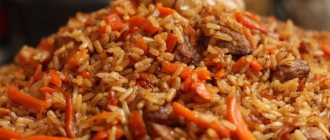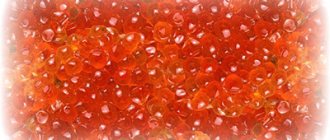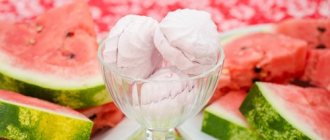What is included in jellied meat?
The main components of jellied meat are, of course, meat and bone broth. It is necessary to give preference to meat, which a woman usually includes in her diet. It is recommended to take bones for broth from the same type of meat. They are needed to obtain natural gelatin. To see how the baby will react to such jelly-like dishes, you need to start preparing broths in advance, the basis of which is chicken feet. This way, the process of getting used to jelly-like products will be much easier for a newborn.
Among the other ingredients for preparing jellied meat, it is not recommended to take products that can cause an allergic reaction in the baby. First of all, this applies to carrots, onions - turnips and garlic. Remember that garlic and onion can negatively affect the taste characteristics of mother's milk, so you need to be careful when adding them to jellied meat.
To prepare one liter of broth, it is enough to take 1 - 2 garlic cloves. Black peppercorns also add to the dish only in small quantities. You can not use these products at all, but prepare jellied meat only from meat and salted broth. It will also benefit the weakened body of a woman feeding a newborn with breast milk.
Is there any harm from the dish?
During lactation, jelly, despite its benefits, can also cause harm. What could be the harm of this dish?
- If a woman includes very fatty broth in her diet, there is a high probability of indigestion in the baby. This composition often contains a large amount of polyunsaturated fats, which can provoke colic and an increase in the amount of gas produced in the baby.
- Very often, allergic reactions in infants are caused by carrots, so it is better to avoid including them in the jelly.
- Onions and garlic, which are constant ingredients of jellied meat, can change the taste of breast milk. In addition, they can provoke allergies in the baby.
- Horseradish and mustard are also often added to this dish. These seasonings contain substances that easily penetrate into the composition of milk and negatively affect the digestive tract of the baby. In order to protect the baby from negative manifestations, jellied meat can be eaten only without the use of the usual hot seasonings.
- Tummy pain and gas can be caused by dill and parsley, which are occasionally added to the jelly.
Eating this dish during breastfeeding is not prohibited. The main thing is to observe moderation and caution, without overusing garlic and other seasonings.
The lactation period requires a woman to pay increased attention to all areas of her life. All foods that the mother eats are passed into the baby's body through breast milk, so it is so important to monitor your own diet. Is it possible to have jellied meat while breastfeeding? This question worries many women, especially on the eve of the New Year holidays, when this dish is on every table.
Is there any benefit from consumption during lactation?
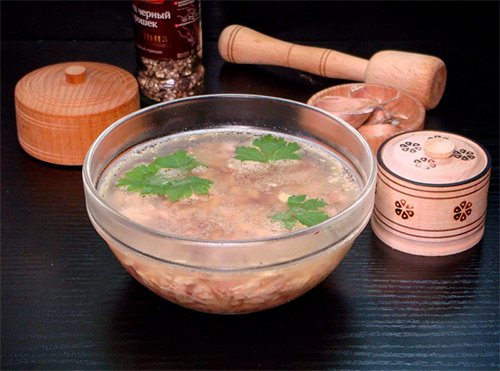
Jellied meat is finely chopped pieces of meat, vegetables and some spices, drenched in bone broth. Prolonged heat treatment promotes the release of gelatin from the bones, which has a positive effect on a woman’s joints. This is very important, because during the period of bearing a child and childbirth, the body was subjected to severe stress.
Jellied meat has the following useful characteristics:
- the content of a large amount of iron in the dish contributes to better recovery of the female body in the postpartum period;
- glycine helps normalize metabolic processes in the body and has a beneficial effect on brain activity;
- thanks to collagen, the hair structure, skin condition and muscle elasticity increase;
- mucopolysaccharides provide strengthening of bone tissue, cartilage and joints;
- fats in jellied meat activate mental activity and help produce energy;
- Thanks to essential amino acids, the entire body functions correctly.
All these useful microelements help a woman recover faster during the postpartum period. Therefore, jellied meat must certainly be present on the menu of a nursing mother.
But you need to be very careful in selecting products and adjusting the composition of the dish so as not to harm children’s health.
Is it possible for a nursing mother to have jellied meat?
During breastfeeding, women have to introduce restrictions into their menu in order to eliminate the harmful effects of many foods on the baby's fragile body. To add variety to the diet and improve the health of the mother, you can use the popular dish jellied meat and its variations such as jelly and aspic.
Beneficial features
The basis of jellied meat is bone broth and meat, divided into small pieces or fibers. During the long heat treatment, gelatin is boiled out of the bones, which is very beneficial for the joints of a woman who has endured high stress on the body during pregnancy and childbirth.
Jellied meat is rich:
- iron;
- glycine (the substance helps normalize metabolism and has a positive effect on brain activity);
- collagen (has a beneficial effect on the condition of hair, skin, makes muscles more elastic);
- mucopolysaccharides (necessary for strengthening bone tissue, cartilage, joints);
- fats (required by the body for energy production and active mental activity);
- essential amino acids (necessary for the proper functioning of the body).
A nursing mother can and should regularly eat jelly, since it contains substances that promote the active restoration of the female body after childbirth. However, you should carefully consider the choice of products and make adjustments to the recipe of the dish so as not to harm the child.
Possible problems and ways to solve them
When breastfeeding, a woman should avoid foods containing:
- increased amount of fat (excessively fatty breast milk is less digestible by the baby and provokes gastrointestinal upset);
- allergens (carrots are a potentially dangerous product in jellied meat);
- spices (herbs and spices added to the broth for flavor change the taste of breast milk - the baby may refuse to eat).
Jelly for a nursing mother should be cooked from lean meat (beef or veal, chicken or turkey, pork without lard) and bones; you can use natural gelatin to obtain a dense structure. It is worth gradually accustoming the baby’s body to a new product by introducing jelly-like broths made from chicken feet into the mother’s menu.
If your child is allergic to carrots, do not add them to jellied meat. It is advisable to limit the use of onions and peppers; garlic is allowed in small quantities - no more than one clove per 2-3 liters of broth.
Of course, a nursing woman can eat the finished dish only without the use of the usual hot seasonings - mustard and horseradish. These seasonings contain substances that easily penetrate milk and change its taste, and can also cause allergies.
Fresh parsley and dill are also not recommended, as they provoke increased gas formation in the baby and associated pain. It is advisable to cut the meat into aspic into small pieces.
Expanding the menu
Like any other new dish, jellied meat is introduced into the diet gradually. For the first time, you are allowed to eat about 50 grams of the product. It is better to do this in the first half of the day so that you can easily monitor the child’s health status.
If within a few hours after the mother ate a new dish, the baby’s behavior became restless, indicating discomfort in the stomach, the experiment with jellied meat should be postponed for about a month - during this time the child’s body will get stronger and will become more successful in coping with new foods.
An allergic reaction in the form of a rash, redness and swelling of the mucous membranes does not always manifest itself “without delay” - you need to monitor the child for two days, without adding any new foods to your diet and complementary feeding.
If the experiment went well, the portion of jellied meat can be increased to 200 grams, but it is not recommended to consume more than 500 grams of this dish during the week.
An important condition: the jellied meat must be homemade, cooked from fresh products of proven quality. You should not use store-bought jelly, made from who knows what and containing preservatives.
vskormi.ru
Can the dish be harmful?
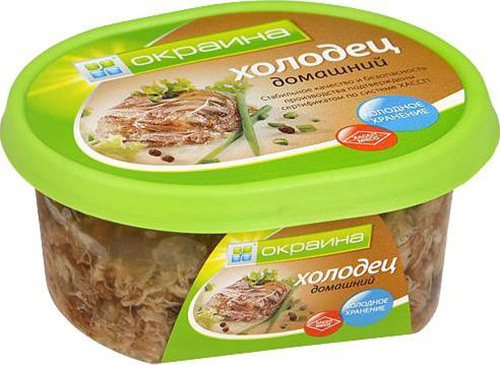
Despite the fact that jellied meat contains only simple ingredients, women with breastfeeding should be careful when consuming it. A broth that is too rich and cooked with fatty meats can cause digestive disorders. Polyunsaturated fats, entering the child's body through mother's milk, contribute to increased gas formation and diarrhea.
In addition, other components of the dish can also negatively affect the health of the baby.
Carrots often cause an allergic reaction in a baby. If a nursing mother has not yet included this vegetable in her diet, then it is recommended to prepare jellied meat during lactation without it.
Thanks to the addition of onions and garlic, the jellied meat acquires a pleasant spiciness, but they can lead to a change in the taste characteristics of mother's milk. In the first months of life, the active substances contained in these products can cause allergies in the baby.
Horseradish and mustard, which are often consumed along with jellied meat, can have a negative impact on the newborn’s digestive system.
Is there any harm from jellied meat during breastfeeding?
It is important to remember that even despite the simple ingredients contained in jellied meat, nursing women also need to treat this dish with caution.
- A negative reaction can be provoked by too fatty broth, which was cooked on the basis of fatty meat varieties. Excess polyunsaturated fats, which can pass into mother's milk, can cause increased gas formation and colic in the baby.
- Carrots can also negatively affect your baby’s digestion. If a nursing mother has not previously introduced this product into her diet, then it is not recommended to immediately add it to jellied meat. Due to the addition of spicy onions or garlic to jellied meat, mother's milk may change the taste and the baby will not want to drink it. To prevent mother's milk from becoming bitter in taste, you should not overuse spicy foods. In addition, the active substances that are found in onions and garlic can cause allergies in the baby, as well as provoke severe colic in the infant.
- Sauces that are often used to season jellied meat pose a great danger to a child’s health. Experts do not recommend that mothers add hot horseradish or mustard to jellied meat to add spiciness to the dish. They can also affect the taste of milk and cause allergies in the baby.
We recommend reading: Monastic tea for gastritis: composition and benefits in treating the disease
Every caring mother who breastfeeds her baby should introduce healthy foods for the baby’s body into her diet. A properly composed menu should consist of healthy vitamins, microelements and minerals. It is also important to ensure that these products do not cause allergies and colic in infants.
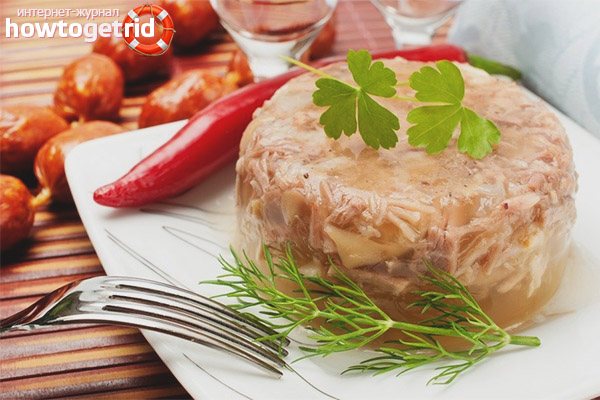
Calcium is considered an important element that a baby’s growing body needs. The lack of this trace element in the mother's breast milk can lead to the fact that the required amount of calcium will be replenished from the reserves of the mother's skeletal system and her teeth. In order for a woman to have enough calcium in her body, she needs to eat foods containing this important element. The list of foods rich in healthy calcium includes jellied meat.
It is important to remember that even despite the simple ingredients contained in jellied meat, nursing women also need to treat this dish with caution.
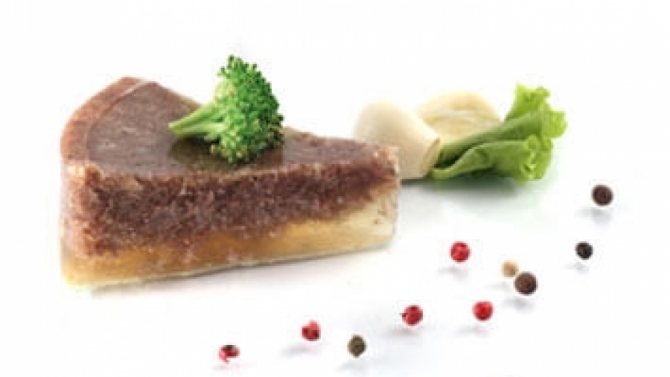
Is it possible to use hot sauces?
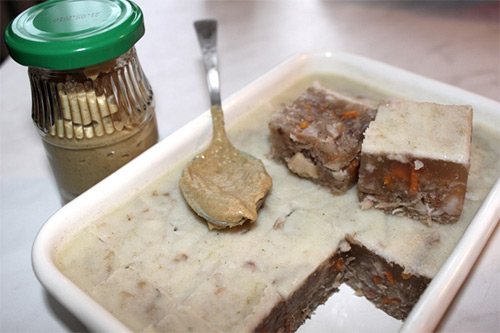
Readers of Ogrudnichke.ru recommend: - Review of the most popular vitamin supplements for children from Garden of Life Read the article >>> - How can Earth Mama products help young parents care for their infants? Read the article - Dong Quai is an amazing plant that helps maintain youth in the female body Read more... - Vitamin complexes, probiotics, omega-3 from Garden of Life, designed specifically for pregnant women Find out more >>>
It is recommended that a nursing mother consume ready-made jellied meat without flavoring it with horseradish or mustard. These seasonings that are familiar to us contain substances that easily penetrate into mother's milk and change its taste. In addition, they can cause an allergic reaction in the baby.
Parsley and dill should also be discarded, since they contribute to increased gas formation in infants, which will lead to pain.
But don't be upset! Jellied meat is good even without any seasonings or sauces!
Possible harm
Despite the simple composition of the dish, jellied meat should be consumed with caution during lactation. The saturation of the broth, especially if it is made from fatty meat, can lead to gastrointestinal disorders. Traces of polyunsaturated fats entering the baby's body through breast milk can cause diarrhea and increased gas formation. In this regard, when cooking jelly, it is recommended to choose lean pieces of meat.
In addition to the broth, nursing mothers should pay attention to those seasonings and “decorations” that are added to the jelly:
- Carrots are a potential allergen, so if you have not yet introduced this root vegetable into your diet, it is better to eat jellied meat during lactation without adding it.
- Onions, usually added to the broth during cooking, as well as fresh garlic, which adds a pleasant pungency to the dish, can slightly change the taste of breast milk. In the early period, traces of the active substances of these fruits can harm the newborn, causing an allergic reaction in the child.
- Mustard and horseradish are forbidden foods for a nursing mother for at least six months after giving birth. Jellied meat should be eaten during lactation without these spicy seasonings - they can negatively affect the baby’s digestion.
If you avoid potentially allergenic foods and prepare jellied meat correctly, then consuming it during breastfeeding will be completely safe for your baby. It is important to note that during lactation you can only eat homemade jelly - industrially produced dishes may contain preservatives and flavorings that are harmful to the baby.
Which meat is best to cook with?
Jellied meat should be prepared during the lactation period from the type of meat that is already included in the diet of a nursing mother.
You can take calf, turkey, chicken or beef. Even pork is allowed, but on the condition that it does not contain a greasy layer.
To isolate natural gelatin, it is also necessary to use bones from the listed carcasses. But you definitely need to accustom your baby to broths in advance. It is better to cook them using chicken feet. This way, the baby can gradually get used to products with a jelly-like consistency.
Features of introducing jellied meat into the diet
Similar to other products, the introduction of jellied meat into a woman’s menu during lactation should be gradual.
For the first dose, a small portion is sufficient, it should not exceed 50 grams of the product. It is recommended to eat jellied meat at the beginning of the day. This way, mommy will have the opportunity to observe the baby’s reaction to an unfamiliar dish.
If, some time after the mother consumed the jellied meat, the baby began to show anxiety, then such behavior can be provoked by a feeling of discomfort that appears in the baby’s tummy. This means that you will need to give up jellied meat for about one month - this time is enough for the child’s body to become stronger and be able to successfully cope with the new dish.
Observation of the baby should last a couple of days, and you should not introduce foods that are still unfamiliar to the baby into your menu.
If the child does not have a negative reaction to the dish, then at the next meal you can eat 200 grams of jellied meat, but this dish cannot be consumed more than 500 grams per week.
It is important that a woman during lactation eats only jellied meat prepared at home. Only high quality and fresh ingredients should be used for it.
It is unacceptable to consume store-bought jellied meat, since preservatives are added to its composition.
When can you eat pancakes and pancakes?
In the third month of your baby’s life, you can try your favorite dish. But at the same time, nursing mothers need to adhere to certain rules:
- You need to have a clear understanding of the child’s body’s reaction to various foods: flour products, butter, eggs that are part of the pancake dough, which were previously consumed by the mother. If there are no negative reactions, you can try pancakes in small quantities.
- As a first experiment, you can eat a piece of pancake in the morning and observe the reaction of the child’s body throughout the day. Possible consequences are redness of the skin, anxiety, itching. These symptoms are evidence of an allergic reaction. Bloating and colic will indicate problems with the gastrointestinal tract.
- It is better to prepare the dough even for test pancakes according to a special recipe. It is better to replace half the flour with oatmeal, use as little butter as possible, use skim milk or whey, discard the chicken egg or replace it with a quail one. You should refrain from using sugar; it can cause a fermentation reaction in the baby’s stomach.
- The best means for kneading dough is drinking water. You can use low-fat milk or whey.
- Flour should be mixed halfway with ground oat flakes or barley flour. It has a beneficial effect on the functioning of the cardiovascular system and helps reduce blood cholesterol. It is good to use special ready-made pancake flour. It is a mixture of three cereal flours: 20% each of buckwheat and corn, the rest is wheat. This mixture is characterized by a high content of vitamins and microelements.
- Bake pancakes in a non-stick frying pan. You can use a piece of brown bread or peeled potato on a fork to grease the bottom of the pan.
- Eat pancakes with already proven products, such as homemade jam or jam, low-fat cottage cheese and others.
Following these simple rules will help you safely introduce a new product to your menu. However, it is better to reduce the consumption of flour to 1-2 times a week. Can I have pancakes if I am still breastfeeding? Yes, under the same conditions.
Cooking jellied meat for mommy
Now we know for sure that a nursing mother can and is even recommended to include jellied meat in her menu. We will give an example of one of the simplest ways to prepare this meat dish. It is not recommended to use complex components for this, as they can pose a danger to the baby’s health.
List of required ingredients:
- chicken carcass weighing approximately 2 kg;
- bay leaf – 1 piece;
- onion – turnip – 1 medium-sized head;
- 1 – 2 cloves of garlic;
- 2 – 3 peppercorns.
Step-by-step preparation:
- You need to remove the skin from the chicken carcass, then put the chicken in a saucepan and add about 4 liters of water. Next, you need to put the pan on high heat and wait for it to boil;
- skim off the fat and foam that forms on the surface of the broth. As soon as the broth boils, turn the heat down and continue cooking for about 4 hours. During this period of time, the volume of water will decrease by half. During the cooking process, you cannot add water, and the pan must certainly be closed with a lid;
- 30 minutes before the end of cooking, add salt to the broth, add garlic cloves, onion and seasonings, and continue cooking;
- then you should remove the boiled meat from the pan and let it cool slightly, after which you need to separate it from the bones. The meat is cut into small pieces, transferred to a deep bowl and filled with broth, which must first be strained. Next, you need to wait for the jellied meat to cool completely, and then put it in the refrigerator to completely harden.
After a few hours, the delicious dish is ready to eat!
A simple recipe for jellied meat
Ingredients:
- chicken carcass, chicken feet – 2 kg
- onion – 1 pc.
- bay leaf – 1 pc.
- garlic – 1 clove
- salt - to taste
- water – 4 l
The sequence of preparing jelly for a nursing mother:
- Wash the chicken and legs without claws, add water, and put on high heat.
- Skim off foam and fat during cooking.
- After the broth boils, reduce the heat, cover the pan with a lid, and cook for 4 hours. You cannot add water, so it is important that it does not evaporate in large quantities. It is permissible to reduce the volume of liquid by 2 times.
- In 30 min. Before the end of cooking, add salt, garlic, peeled whole onion, and bay leaf.
- After cooking, remove the meat and let it cool slightly. Separate from bones and skin, cut into pieces, place in shallow containers.
- Fill the molds with the meat with the strained broth, cool, and put in the refrigerator for several hours.
From this article you will find out
whether a nursing mother can have jellied meat
Can a nursing mother eat jellied meat? Will this harm the newborn? There is a direct relationship, everything that enters the stomach is eventually broken down and enters the bloodstream, respectively, into the milk, and then to the child. Therefore, a nursing mother should always think about what she eats; sweet, fatty, spicy, salty, smoked, fried, cucumbers, tomatoes, sauces, sparkling water, white cabbage, raisins, black bread, all red vegetables and fruits are excluded from the diet. beets, milk up to 500 ml, red types of fish, juices other than apple juice, preferably compotes.
It is important that a nursing mother receives a sufficient amount of calcium in her diet. Otherwise, the lack of calcium in breast milk will be replenished by the bones and teeth of the nursing mother. That's why jellied meat is a welcome addition - a light and rich source of calcium. It completely replaces meat and milk, which are not recommended by doctors. It is advisable to make jellied meat without garlic and spices.
Is it possible for a nursing mother to have jellied meat?
In general, a nursing mother should have a strict diet.
It is believed that a nursing woman needs some special, super-healthy food, and is also deprived of many gastronomic joys. In fact, you can eat almost anything while breastfeeding. You just need to exclude from your diet those foods that cause an allergic reaction in you or the baby’s father and can cause childhood diathesis. You cannot use exotic foods in your diet that are not typical for your climate zone. It is also desirable that your food is healthy and varied. By the way, not only the child, but also you yourself need this in order to look good and recover after childbirth. The only thing you need to give up is alcoholic drinks and smoking. They do not benefit either you or your baby.
Limit whole milk (fermented milk is usually allowed, but if you’re scared, you can limit it too). Where can you get the much-needed calcium? This is where we remember about jellied meat. The best source of calcium is well-cooked meat and fish broths (the kind that you put in the refrigerator and they turn into jellied meat). But jellied meat for feeding during feeding is different from the usual one.
Is it possible for a nursing mother to have jellied meat?
Classic recipe for making jellied meat:
Jellied meat is boiled for 6 to 12 hours. But the longer you cook it, the richer and stronger the dish will be.
- First of all, defrost the meat and soak it for 1-1.5 hours in cool water.
- Set the meat components of the jellied meat to cook.
- It is better to start cooking vegetables, like seasonings, together with meat. Cooking time for vegetables is 1.5 hours.
- After the water boils, turn the heat to low.
- When the meat is ready, place it on a plate and let cool. Then break it into small pieces with your hands.
- Place the meat in prepared containers. Add beautifully chopped boiled vegetables to each.
- Strain the broth through cheesecloth and pour into containers.
- The containers must be placed in a cold place until the jellied meat has completely hardened.
Now let's look at what restrictions there are when making jellied meat during breastfeeding.
It should be cooked specifically on beef and chicken. The meat is ground into smaller pieces. If made without gelatin, the beef is replaced with pork legs. Spices, onions, garlic are excluded.
Consumption of jellied meat by a nursing mother should be moderate, in small portions. Remember, jellied meat is a big burden on the liver and pancreas.
Jellied meat is not a prohibited dish for consumption when breastfeeding, because it does not contain any harmful or unsafe products for the baby. But it is still necessary to adhere to certain rules when introducing it into the diet, because components such as carrots, as well as rich and fatty broth, can cause intestinal dysfunction, colic and increased gas formation.
Before introducing jellied meat into the menu, a nursing mother must successfully introduce all its components into the diet. But, if you have an allergy, for example, to carrots, you can exclude it from the ingredients of this dish. It is also recommended to adhere to the following tips:
- since jellied meat has a fairly high gelatin content, it is recommended to initially introduce broths based on chicken feet into the diet, so you can monitor the baby’s reaction to such food;
- For the first tasting, cook broth for jellied meat based on the meat that you most often eat - lean pork or chicken. It is also recommended not to put too much garlic as a spice - no more than 1 clove per 2 liters. broth;
- when first administered, you should eat a small portion of jellied meat (no more than 50-70g) in the first half of the day, not on an empty stomach;
- if the baby has no unwanted reactions within 2 days, you can gradually increase the amount of this dish in the diet;
- The daily consumption of jellied meat for a nursing mother is 200g, and the weekly consumption is 500g. Moreover, this figure decreases by 1.5 times if the finished dish has a high garlic content.
If the baby does not show signs of anxiety from colic or other disorders of the digestive system, the mother can eat jellied meat without fear for his health.
Every woman during breastfeeding must certainly include in her diet foods that will provide the baby’s body with vitamins, beneficial microelements and minerals. It is important that they do not provoke an allergic reaction or bloating in the baby. One of the most important elements needed by a growing child's body is calcium. A lack of calcium in breast milk will result in its volume being replenished from the mother's bones and teeth. Among the foods high in calcium is jellied meat, beloved by many.
We will talk about whether a woman can eat jellied meat while breastfeeding in this article.
Drawing conclusions
Now we know that a woman’s consumption of jellied meat during the lactation period is not only not prohibited, but also has a positive effect on women’s health. It helps mommy recover after a long period of gestation and childbirth. But this applies exclusively to jellied meat prepared independently.
All components used for its preparation must be fresh and of high quality. While a woman is feeding her baby with breast milk, there can be no question of any store-bought aspic in her diet. As a rule, they are prepared from products of not very good quality and using preservatives. And this can cause significant harm to the health of an infant.
Health to you and your kids!
Useful properties and composition
Jellied meat contains a lot of useful substances. As for the chemical component, in this dish you can find such elements as boron and rubidium, fluorine and copper, vanadium and phosphorus, calcium and sulfur. All of them are necessary for the proper functioning of the body of a woman who has recently given birth to a child.
Some people believe that the long process of heat treatment does not leave a single vitamin or valuable element in the jellied meat. However, this opinion is erroneous; the dish is distinguished by a large amount of iron, vitamins A, C and B9.
The benefits of eating jellied meat are achieved due to the fact that it contains many useful substances; the chemical composition of this dish is very diverse and includes:
- glycine: activates brain activity, improves memory and stimulates metabolism;
- collagen: increases the elasticity of the skin and the elasticity of muscle tissue;
- fat: stimulates the production of energy, so necessary for the body of a young mother;
- mucopolysaccharides: strengthen bones, cartilage and joints;
- other amino acids: vital for the body of a nursing mother, who will share useful substances with the baby;
- a large amount of iron prevents its deficiency in the body and does not allow the development of anemia, a frequent companion of the postpartum period.
We recommend reading: Liver tests: blood test, interpretation, norm
The beneficial characteristics of jellied meat for a woman nursing a baby are proven by the fact that the use of jellied meat is not only not prohibited, but is recommended during breastfeeding. The main thing is to carefully consider the choice of products for its preparation, so that the dish does not harm either the mother or the baby.

